Do you love eggs, but struggle to consistently achieve the perfect texture? Have no fear – egg cookers are here! In this article, we will explore the various types of egg cookers available in the market. From electric models to pressure cookers, there is a wide variety of egg cookers to choose from.
No matter what your preference is, there is sure to be an egg cooker that will enhance your breakfast routine. Keep reading to discover which type is best for you!
Electric Egg Cookers
If you’re looking for a hassle-free way to prepare eggs, electric egg cookers may be just what you need. These compact devices offer a convenient way to boil, steam, and poach eggs with ease, without the need for pots or stovetops.
What’s great about electric egg cookers is that they come in different models that allow for different doneness levels. Some models can prepare hard-boiled eggs, while others can handle soft-boiled or medium-boiled eggs. This gives you the flexibility to cater to everyone’s preferences at breakfast time.
Some electric egg cookers are even equipped with built-in piercing tools and alarms that notify you when your eggs are ready. This means no more guessing and peeling half-cooked eggs!
Features of Electric Egg Cookers
Electric egg cookers come with a variety of features and accessories to make your cooking experience faster and more enjoyable. Some common features you may find in these devices include:
- Automatic shut-off systems to prevent overcooking.
- Non-stick coatings for easy cleaning.
- Detachable trays and holders for easy serving and storage.
- Built-in water measuring lines to help you fill up to the right level.
How to Use an Electric Egg Cooker
Using an electric egg cooker is straightforward and intuitive. Here’s a simple step-by-step guide to get started:
- Fill the cooker with the recommended amount of water according to the instructions.
- Place the eggs in the egg holder or tray provided, or directly in the water if the model allows it.
- Set the cooking time and doneness level as desired.
- Turn on the cooker.
- Wait for the cooker to finish cooking and remove the eggs using tongs or a spoon.
Electric egg cookers are incredibly versatile and can be a great addition to any kitchen. With their different features and functionalities, you can enjoy perfectly cooked eggs every time!
Basic Egg Cookers
If you prefer a simple approach to egg cooking, basic egg cookers are an ideal option. These egg cookers are designed to boil or steam eggs to perfection and provide adjustable doneness levels so you can get the consistency you desire. Basic egg cookers are straightforward and easy to use, making them a popular choice for those who want to achieve perfect eggs without any hassle.
One great benefit of basic egg cookers is their versatility. You can combine eggs with other ingredients to make a well-balanced breakfast. Denser vegetables such as potatoes and carrots can be cooked well in a microwave while quicker-cooking greens like asparagus, spinach, and broccoli may be a better stovetop option.
Another advantage of basic egg cookers is portability. These models are often smaller and easier to carry, making them perfect for on-the-go breakfast or brunch. If you’re looking for a straightforward, easy-to-use option, a basic egg cooker is the perfect appliance for your kitchen.

Features of Basic Egg Cookers:
| Features | Description |
|---|---|
| Adjustable Doneness Levels | Basic egg cookers have adjustable doneness levels, so you can cook eggs with the hard, medium, or soft consistency you desire. |
| Compact Size | Basic egg cookers come in a compact size, which makes them easier to store and allows you to carry them with you wherever you go. |
| Easy to Clean | Basic egg cookers are easy to clean as most models come with non-stick surfaces. |
| Simple Operation | Basic egg cookers have a simple operation. Most models come with just one button that starts and stops the cooking process. |
Multi-Function Egg Cookers
Looking for versatility in your egg cooker? Multi-function egg cookers offer more than just boiling, making them a smart choice for the adventurous cook. With options for poaching, scrambling, and even steaming omelets and vegetables, these cookers are a great way to expand your breakfast repertoire.
What sets multi-function egg cookers apart? These cookers often come with multiple tiers, trays, and accessories, perfect for making a variety of egg dishes. Best of all, these cookers can handle much more than just eggs. Here are a few examples:
| Cooking Function | Examples |
|---|---|
| Poaching | Eggs Benedict, poached eggs over avocado toast |
| Scrambling | Fluffy scrambled eggs, cheese and veggie omelets |
| Steaming | Vegetables, dumplings, fish |
All of these options allow you to take your egg cooker from a one-trick pony to a versatile kitchen staple. If you want a cooking appliance that can do more than just boil eggs, a multi-function egg cooker is a great choice.
One of the great advantages of multi-function egg cookers is the ability to experiment with different egg dishes. You can try new ingredients and recipes easily, broadening your skills in the kitchen. You never know what new breakfast combinations you might discover!
When shopping for an egg cooker, consider the versatility and numerous options of the multi-function models. Regardless of your cooking level, they are easy to use and provide an assortment of cooking possibilities.
Pressure Cooker Egg Cookers
If you’re someone who prioritizes perfect textures and efficiency, a pressure cooker egg cooker is the way to go. These ingenious appliances use pressure to achieve faster and more precise cooking, producing mouth-watering eggs with custardy yolks and jammy centers.
Pressure cooker egg cookers are particularly great for soft-boiled eggs, providing ultimate control over the cooking process. With the ability to cook multiple eggs at once, you can whip up breakfast for the whole family in no time.
If you’re interested in trying out a pressure cooker egg cooker, some popular brands include Instant Pot, Ninja Foodi, and Cuisinart.
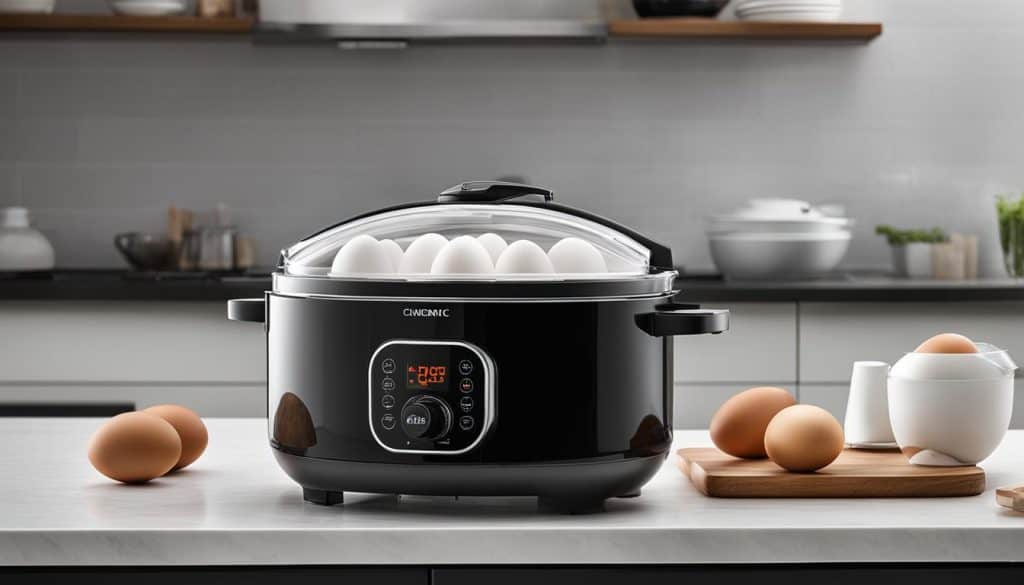
“I love my Instant Pot pressure cooker egg cooker. It saves so much time and produces consistently delicious eggs every time!” – Jane Doe
Microwave Egg Cookers
If you’re short on time but still want a protein-packed breakfast, microwave egg cookers are the way to go. With single-egg cookers, you can prepare individual servings in no time. Simply crack an egg into the pod-like container, add water, and microwave for a minute or two depending on your desired level of doneness.
Multi-egg cookers are also available if you’re cooking for a family or a group of friends. These cookers can cook multiple eggs at once and offer various doneness levels, from soft to hard-boiled. Plus, they are stackable, making them an ideal space-saving option for small kitchens.
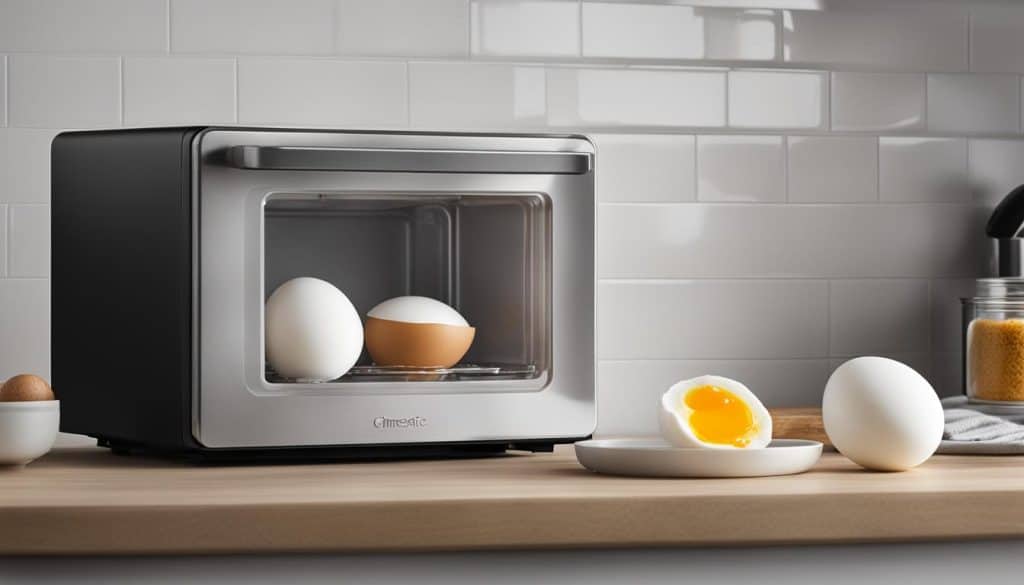
However, it’s essential to note that microwaving eggs can be tricky. Overcooking can lead to rubbery eggs, while undercooking can leave them runny and unappetizing. Make sure to follow the manufacturer’s instructions carefully, and experiment to find the right cooking time for your microwave, based on its power output.
Other Egg Cooking Methods
Apart from dedicated egg cookers, there are other methods you can use to cook eggs. Stovetop pots and steamers allow for boiling, poaching, and steaming eggs with precise control over cooking time and temperature.
For instance, to use a stovetop pot, bring water to a boil and add your eggs using a slotted spoon. Allow the eggs to cook according to your preferred doneness level and remove them from the pot using the same slotted spoon. Steaming eggs using a steamer basket over boiling water allows you to obtain consistent results.
Alternatively, while not exclusively an egg cooker, the instant pot’s pressure steaming function can also be used to achieve perfectly cooked soft-boiled and hard-boiled eggs.
Stovetop Pots and Steamers
Stovetop pots and steamers are the traditional method of cooking eggs. Boiling water in a pot with a steamer basket provides precise control over the cooking process. This method allows for boiling, poaching, and steaming eggs, making it versatile and suitable for achieving specific textures.
| Egg Cooking Method | Cooking Time | Preparation Time | Pros | Cons |
|---|---|---|---|---|
| Stovetop Pots and Steamers | 6-12 minutes | 2 minutes | Easy to control water temperature and cooking time | Requires constant attention and manual monitoring |
Instant Pot Pressure Cooker
The instant pot’s pressure steaming function offers a faster and more efficient way to cook eggs. Although it’s not an egg cooker specifically, it allows for perfect results every time.
| Egg Cooking Method | Cooking Time | Preparation Time | Pros | Cons |
|---|---|---|---|---|
| Instant Pot Pressure Cooker | 4-5 minutes | 5 minutes for pressure buildup | Quick and efficient method, precise doneness level | Not a dedicated egg cooker, requires learning specific cooking techniques |
Stovetop Pots and Steamers
If you’re a traditionalist, stovetop pots and steamers might be your go-to for perfectly cooked eggs. With this method, boiling water in a pot with a steamer basket provides precise control over the cooking process. Not only can you boil eggs, but you can also poach and steam them to achieve specific textures and flavors.
To get started, fill a pot with enough water to cover the eggs and bring it to a rolling boil. Then, add the eggs to the steamer basket and place it in the pot. Cover the pot with a lid and wait for your eggs to cook according to your desired doneness level.
If you prefer poached eggs, crack them into individual cups before placing them in the steamer basket. For steamed eggs, lightly coat the basket with cooking spray before cracking them into it.
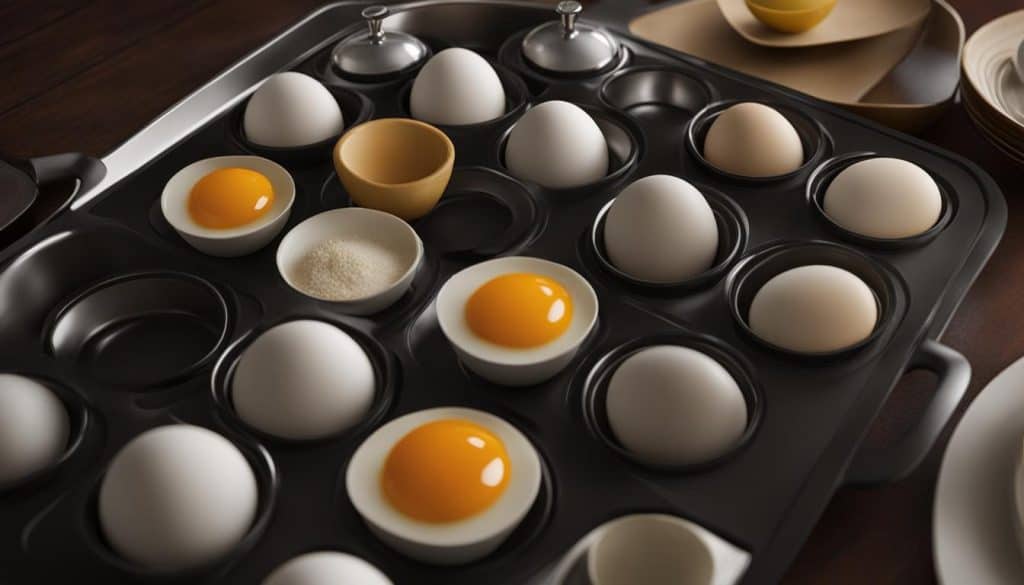
Stovetop pots and steamers can be versatile and easy to use. They are also a preferred method for those who value precision and specific textures. And if you’re a fan of other stovetop methods like cast iron skillets, consider pairing them with stovetop pots and steamers to expand your egg-cooking repertoire.
Instant Pot Pressure Cooker
Even if the instant pot pressure cooker is not specifically designed for eggs, you can utilize its pressure steaming function to cook perfect hard-boiled and soft-boiled eggs. This innovative device offers convenience and versatility to your breakfast routine, allowing you to cook various dishes with minimal time and effort.
To cook hard-boiled eggs using an instant pot pressure cooker, add a cup of water to the pot, insert the steaming rack, place the eggs on top, and cook on high pressure for five to seven minutes, depending on your desired consistency.
For soft-boiled eggs, cook them on high pressure for just t ee to four minutes. Whether you’re a busy professional or a homemaker, an instant pot pressure cooker can cater to your breakfast needs effectively.
Check out the following table to compare different types of egg cookers based on their advantages and disadvantages.
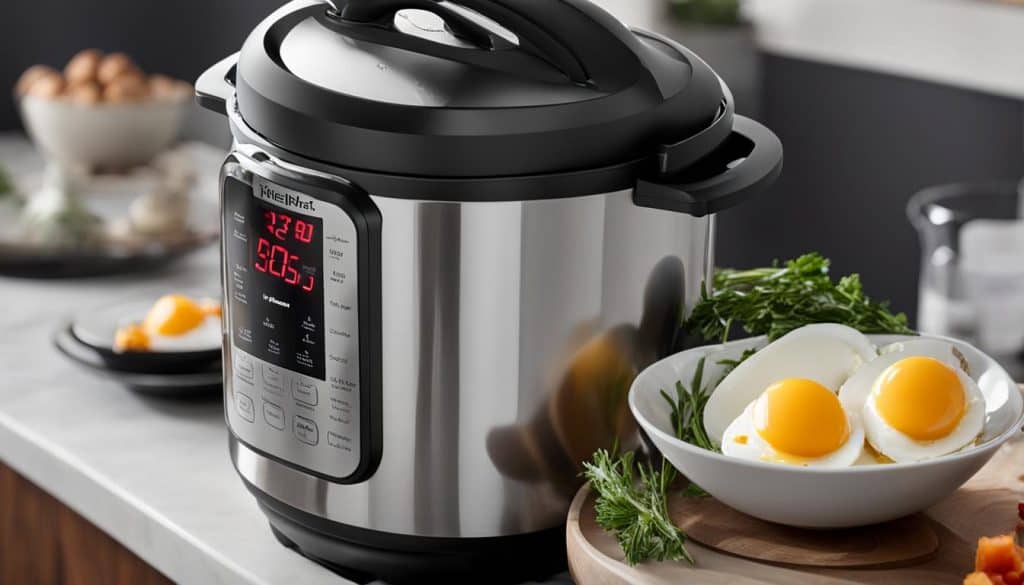
| Type of Egg Cooker | Advantages | Disadvantages |
|---|---|---|
| Electric Egg Cookers | Compact, easy to use, adjustable doneness levels | Size limitations, can only cook eggs |
| Basic Egg Cookers | Simple to use, adjustable doneness levels | Cannot cook other egg dishes, limited features |
| Multi-Function Egg Cookers | Versatile, can cook different egg dishes, multi-tiered | Costly, bulky, complex to use |
| Pressure Cooker Egg Cookers | Precise cooking, faster cooking time, consistent results | Costly, size limitations |
| Microwave Egg Cookers | Quick and convenient, easy to use, compact | May overcook or undercook eggs, limited capacity |
| Stovetop Pots and Steamers | Precise control over cooking process, versatile, can cook other dishes with ease | Time-consuming, requires monitoring |
Conclusion
Congratulations! You now have a comprehensive understanding of the different types of egg cookers available on the market. Whether you opt for an electric egg cooker, a multi-function model, or even utilize alternative cooking methods, there is a perfect egg cooker out there to suit your needs and enhance your breakfast routine.
Remember to consider factors such as the number of eggs you want to cook, your preferred doneness levels, and the accessories you may need to create various egg dishes. With the right egg cooker, you can enjoy your favorite eggs just the way you like them, hassle-free!
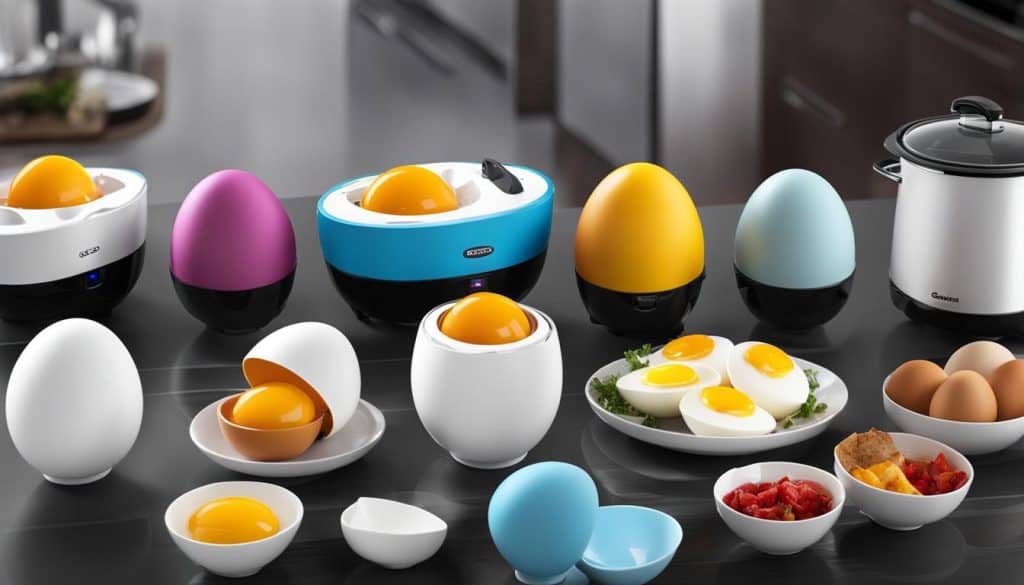
Thank you for reading our guide to different types of egg cookers. We hope this article has been informative and helpful in your search for the perfect egg cooker. Happy cooking!
Frequently Asked Questions
Here are some frequently asked questions about egg cookers:
1. Can I cook other foods in an egg cooker?
Generally, egg cookers are designed specifically for cooking eggs, but some multi-functional models may also have options for steaming vegetables or cooking other egg-based dishes like omelets.
2. How do I clean an egg cooker?
Cleaning an egg cooker is easy and typically involves a quick wipe down with a damp cloth or sponge. Some models may be dishwasher safe and can be easily disassembled for cleaning.
3. Can I adjust the doneness level of my eggs?
Yes, many egg cookers allow you to adjust the cooking time or have settings for different doneness levels, such as soft, medium, or hard-boiled eggs.
4. How long does it take to cook eggs in an egg cooker?
Cooking times can vary depending on the type of egg cooker and the desired doneness level. Electric egg cookers typically take 10-12 minutes to produce hard-boiled eggs, while microwave egg cookers can cook a single egg in under a minute.
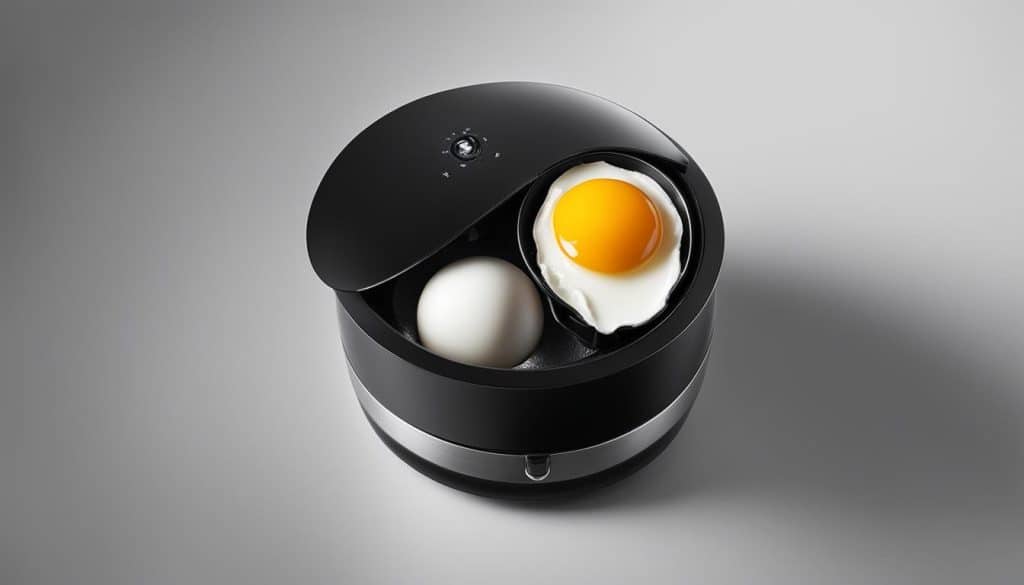
5. Are egg cookers safe to use?
Yes, egg cookers are generally safe to use when operated according to the manufacturer’s instructions. Some models may have safety features like automatic shut-off or built-in timers to prevent overcooking or overheating.
Additional Tips for Perfectly Cooked Eggs
Now that you have chosen your preferred egg cooker, it’s time to make sure you cook your eggs to perfection! Here are some additional tips to help you achieve the perfect egg:
- For hard-boiled eggs, use eggs that are at least a week old. Fresh eggs can be challenging to peel.
- For soft-boiled and medium-boiled eggs, place the eggs in cold water and bring them to a boil. Once the water starts boiling, remove the pot from the heat and let the eggs sit in the water for the desired time.
- For poached eggs, add a tablespoon of white vinegar to the boiling water. The vinegar helps the egg whites set faster and prevents them from spreading out.
- If you prefer scrambled eggs, add a splash of milk or cream to the beaten eggs before cooking. This will result in creamy and flavorful eggs.
- Be sure not to overcook your eggs, which can result in tough egg whites and dry yolks.
By following these tips, you’ll be able to cook the perfect egg every time, no matter which type of egg cooker you use.